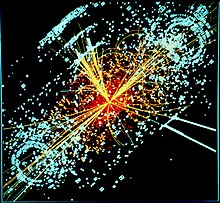 This is obviously not
what “LHC” stands for, yet not only a vast number of people from the scientific
community but also civil people may actually consider this name a suitable choice;
the erection of the Large Hadron Collider (LHC), the largest particle
accelerator in the world—and highest-energy one as well—began in 1998 in the
frontier between Sweden and France—close to the city of Geneva—and finished four
years ago by the CERN (Conseil Européen pour la Recherche Nucléaire [European Organisation for Nuclear Research]).
This is obviously not
what “LHC” stands for, yet not only a vast number of people from the scientific
community but also civil people may actually consider this name a suitable choice;
the erection of the Large Hadron Collider (LHC), the largest particle
accelerator in the world—and highest-energy one as well—began in 1998 in the
frontier between Sweden and France—close to the city of Geneva—and finished four
years ago by the CERN (Conseil Européen pour la Recherche Nucléaire [European Organisation for Nuclear Research]).
The pursuit for hints that can lead
these nuclear scientists to the discovery of the key constituents of matter,
the scrutiny in the course of a possible set of hidden dimensions, and the
unearthing of the tremendously sought-after Higgs Boson, which is considered the elemental particle of the substance of the whole universe (i.e., the very
origin of it), are the major purpose of the construction of this 27-kilometre cylinder.
Nevertheless, these tempting raisons
d'être became nothing against the terror unleashed a few years ago by the
time the LHC was set into gear; this colossal particle accelerator has been
said to be the potential reason of the end of the world. How is this possible?
Why was this sort of massive destruction weapon built, knowing that it could
mean the end of life in planet Earth as we know it?
 This controversy came out in 2008 when a group of
scientists presented their complaint to the court of the CERN after having made
some speculations about the possible creation of antimatter or black holes,
which means that the Earth—probably along with other planets and satellites—would
get absorbed and destroyed.
This controversy came out in 2008 when a group of
scientists presented their complaint to the court of the CERN after having made
some speculations about the possible creation of antimatter or black holes,
which means that the Earth—probably along with other planets and satellites—would
get absorbed and destroyed.
In simple
terms, what happens inside the LHC is a series of ‘mini-big-bangs’ that are
supposed to last a few seconds and then vanish into thin air—something that has
not been proven yet, which has caused this hullabaloo. However, these speculations
seem not to have any mathematical support and scientists affirm that there is
not anything to be concerned about.
It is incredible how far can the curiosity of the human being can go; I never thought that there could be a machine that could produce a little Big Bang. I also read that the Large Hadron Collider could be the first time machine! How is that possible? Does it mean that "Back to the Future" is not such an utopia after all?
ReplyDeleteYes, you are right; it is believed that the LHC is a potential time machine, yet it would not be possible for humans to travel in time, but subatomic particles would be able to. "How is this possible?" you say? The discovery of the Higgs Boson would lead to the release of another particle named Higgs Singlet, which is believed to open a sort of "portal" to the fifth dimension--where substances can move freely to the past or the future; however, this is a trip with no control and that is why it would be possible only for subatomic particles.
Delete